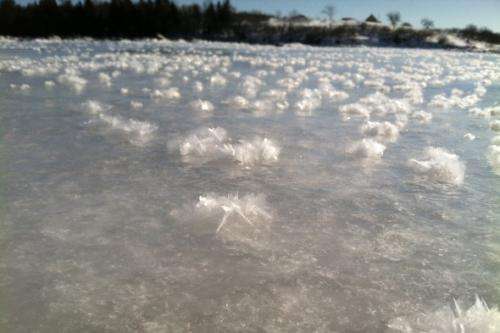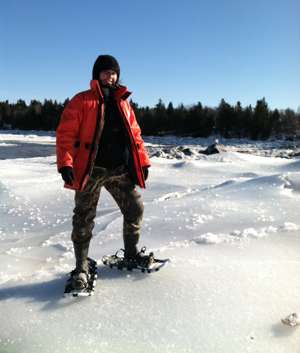A majestic backdrop for marine research

This time of year, performing field research in the Gulf of Maine often means braving the bitter cold. Such conditions were in full force on Feb. 24 when Northeastern graduate student Jessica Torossian headed north to check up on the blue mussels she's studying there. But on this day, biting chills also brought winter's beauty to her outdoor lab in the form of frost flowers, which can bloom on the surface of newly formed ice in extremely cold and dry conditions.
This was the case at West River Landing in Addison, Maine, which serves as the majestic backdrop for Torossian's ongoing research. "The landscape looked like the Arctic," she recalled. "I'd never seen anything like it."
Torossian works in professor Brian Helmuth's lab at Northeastern's Marine Science Center in Nahant, Massachusetts. One of her projects involves examining blue mussels—or Mytilus edulis, the mussels you'll find on menus at seafood restaurants in New England—which have been dying off there in the winter. She wants to learn more about how cold temperatures affect mussel survival in the gulf, in the context of climate change. Torossian noted that people often think about climate change in terms of how warm it will get. But climate change experts, she said, note that the phenomenon might also lead to more extreme cold events even though the average temperature is rising.
"We are trying to look at those very cold temperatures and see how these conditions are affecting the mussels' survival," said Torossian, who is pursuing her doctorate in ecology, evolution, and marine biology.
This work is part of the Helmuth Lab's broader research to better understand how weather and climate are driving ecological patterns seen in nature—for example, the effect stressors such as temperature, invasive predators, and food availability have on geographic distribution and the populations of certain species. As Torossian put it, knowing how a particular mussel responds when exposed to cooler or warmer temperatures can help inform how it will respond to climate change over time.

This type of ecological forecasting is a primary focus at the lab, she said, and it has major implications for ecosystems management and identifying vulnerable marine populations.
Torossian and Scott Morello, a postdoctoral research associate at the Downeast Institute with whom she's working, are curious why they are finding blue mussels in the intertidal mud flats and not on the rocks. They think the mud is acting as a thermal buffer protecting the mussels from the cold. To test their theory, they're placing temperature loggers inside empty mussel shells.
These modified iButton devices log data in 10-minute intervals, but they tend to run out of memory after two months. So on this frosty February day, Torossian and Morello were replacing the loggers, pulling the new temperature data, and checking up on the mussels they had transplanted to the rocks. They found that while the mussels on the rocks had died, most of the ones burrowed in the mud under the ice were still alive. The temperature data they collected shows that during extreme cold events mussels on the rocks could experience temperatures between 10 to 12 degrees Celsius (18 to 21.6 degrees Fahrenheit) colder than mussels in the mud.
Torossian expects to continue studying these blue mussels through the summer months to see how they respond to warmer temperatures, and how those responses vary between the mussels on the rocks and those in the mud.
Provided by Northeastern University
















